Canada's Foreign Interference Commission To Review Adding Iran To List
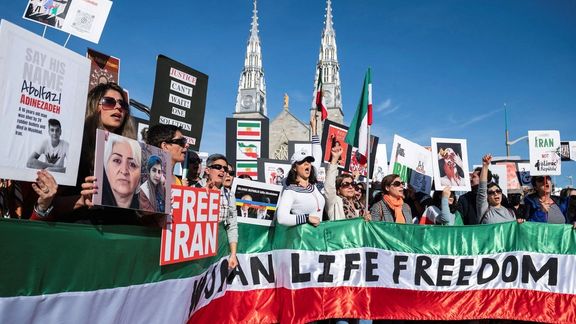
Canada's Foreign Interference Commission is set to decide on adding Iran to its list of foreign governments meddling in the country's internal political affairs.

Canada's Foreign Interference Commission is set to decide on adding Iran to its list of foreign governments meddling in the country's internal political affairs.
In September, Canada launched a public inquiry into the interference of foreign governments, particularly Russia, China and India, in the country’s federal electoral processes and democratic institutions.
At its meeting on Wednesday, the commission hosted representatives of the immigrant communities from Iran, Russian, China and India.
Canada-based Iranian dissident Hamed Esmaeilion warned Iran should be included in the list of the countries to be investigated by the commission.
Esmaeilion, who attended the commission’s meeting as the representative of the families of victims who perished in the downing of a Ukrainian airliner by the IRGC in 2020, said, "Although Iran’s name is not yet on the list of the commission, I attended the meeting to discuss Tehran’s attempts to interfere with Canadian affairs."
He told Iran International that there are institutions affiliated with the Iranian regime which operate in Canada, saying, "These institutions are in the minority but try to influence Canada’s macro policies."
Should Iran be added to the list, Canada’s security and intelligence agencies will be obligated to provide the commission with confidential information so that it can decide about Iran’s possible role in Canada’s domestic policies, especially 2019 and 2021 elections.
In November, Microsoft’s Threat Analysis Center (MTAC) warned that Iran, Russia and China are likely to plan to influence the upcoming elections in the US and other countries in 2024.
Last month, Canadian-Iranian lawmaker, Ali Ehsassi, called for an inquiry about Tehran’s potential interference in the country’s elections.
“Given the catalogue of malign and illegal activities committed by the Islamic Republic of Iran on Canadian soil, it would be naïve to believe that the Iranian regime has any compunction to shape public opinion in Canada,” he said in a letter to the Foreign Interference Commission, calling for soliciting testimony and relevant documentation from Iranian-Canadians and others with a substantial interest in the proceedings.
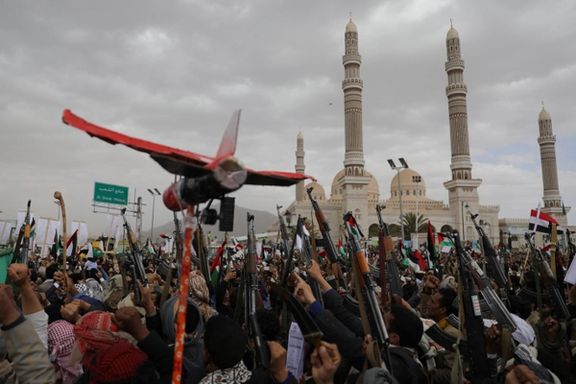
The United States military announced on Wednesday that it had intercepted and destroyed four drones launched by Iran-backed Houthis in Yemen, aimed at a US warship navigating the Red Sea.
According to a statement released by US Central Command on X, formerly Twitter, the engagement occurred at approximately 2am local time in Sanaa (2300 GMT). No injuries or damage to US or coalition ships were reported in the operation.
"These actions are taken to protect freedom of navigation and make international waters safer and more secure for US Navy and merchant vessels," the statement reiterated.
The incident follows a series of aggressive moves by the Houthis, including drone and missile strikes targeting vessels in the Red Sea. These attacks, which began in November, were purportedly conducted in solidarity with Palestinians during Israel's conflict with Hamas militants in the Gaza Strip.
In response to the escalating hostilities, both US and British forces have conducted strikes against the Houthis. The group has since declared American and British interests as legitimate targets, further heightening tensions in the region.
The new drone attacks by the Houthis against the United States come one day after the imposition of new sanctions by the US Department of the Treasury against the Quds Force of the Islamic Revolutionary Guard Corps and two proxy groups affiliated with it, the Yemeni Houthi militants, and Hezbollah in Lebanon, as well as 11 individuals and entities supporting the Syrian President Bashar al-Assad.
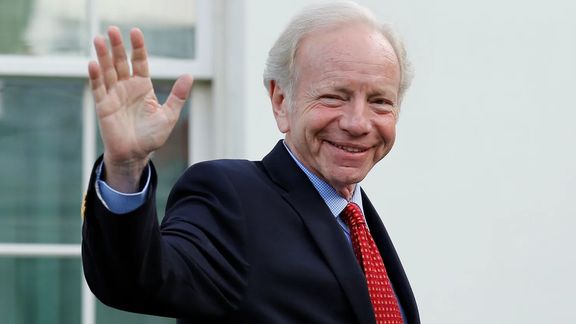
Former US Senator and vice presidential nominee Joe Lieberman has died at 82 following complications from a fall.
“Senator Lieberman's love of God, his family, and America endured throughout his life of service in the public interest,” the statement on Wednesday from his family said.
He also served as the chairman of the United Against Nuclear Iran, an advocacy group founded in 2008 to prevent the Iranian regime from turning into a nuclear power.
This veteran Jewish politician was a staunch supporter of Israel and strongly opposed negotiations with the Iranian government.
In the Democratic presidential campaign in 2000, Lieberman was Al Gore's running mate, hence becoming “the first Jewish candidate on a major political party ticket,” CBS News wrote.
“It was an honor to stand side-by-side with him on the campaign trail … I'll remain forever grateful for his tireless efforts to build a better future for America," said Gore in a statement.
Although Lieberman was a Democrat, he voted against the party on a number of important issues, including his support for the Iraq war.
During the 2008 presidential campaign, Lieberman backed Republican John McCain over Barack Obama, in contrast to the Democratic Party’s position.
In 2006, Lieberman ran for the Senate for the last time as an independent, non-Partisan candidate and won. In total, he represented the state of Connecticut in the Senate from 1989 to 2013.
Challenging the Pentagon’s “Don’t Ask, Don’t Tell” policy, Lieberman notably supported queer people and their service in the US army without having to conceal their sexual orientations.

Human rights monitoring groups concur that executions in Iran have reached unprecedented levels following the widespread protests of 2022, as indicated by figures compiled by these entities.
At least 767 Iranians were executed in the year ending March 2024, according to the Human Rights Activists News Agency (HRANA). That is more than double the figure for the year ending March 2022, when 333 were executed. Some human rights reports have mentioned a slightly higher numbers.
Many human rights activists say the executions have very little to do with justice and are designed primarily to ‘set examples’ and instill fear in the wider society to make it easier to control. At least eight people were hanged over trumped-up charges related to the nationwide protests of 2022, with several more protesters currently on death row.
A recent Amnesty International report further underscored the severity of the situation, revealing that from January 1, 2012, to July 31, 2023, over five thousand individuals, including at least 57 children, were executed in Iran.
It is widely believed that most executions in Iran are drug-related. There’s little trust in official accounts, however, since there’s no transparency and no real due process. So activists say they fear that the regime may use criminal charges as cover for political cases, especially if the accused is from the ‘periphery’ and lacks support networks to follow and publicize their case.
The United Nations special rapporteur on human rights in Iran has stated that the number of executions of ethnic and religious minorities in Iran is disproportionately high.
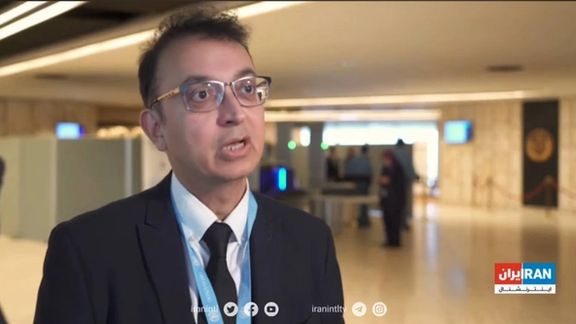
According to human rights watchers Hengaw, in 2023, about 4 out 10 of all executions have been Baluch (183) or Kurd (151). Both ethnic groups are highly active politically, and both played parts in the most recent wave of protests (2022) that was far greater than their size in Iran’s population.
Iranian judiciary officials routinely deny any conflation of dissent with criminal activity. When questioned by Western journalists about executions or human rights abuses, Iranian officials consistently maintain the official stance that the judiciary operates independently and is not answerable to the presidential administration.
While the latter claim holds some truth, the former does not. In reality, Iran’s judiciary primarily serves as a tool to suppress dissent, a role it has fulfilled since the inception of the regime in 1979. Even constitutionally, the judiciary lacks true independence, as its head is appointed and dismissed by the Supreme Leader.
It's no surprise, then, that the judicial system tends to align closely with the desires and directives of Supreme Leader Ali Khamenei.
In July 2022, prior to the widespread protests in Iran (now better known as Women Life Freedome uprising), Khamenei made a dark reference to the notorious 1980s, when thousands of political prisoners were executed summarily, often after one or two questions, without even a sham trial.
"Our God today is the same God of the 1980s," he said.
The judiciary got the message. So did human rights organizations and activists, many of whom warned of more executions on the horizon. And they seem to have been right.
In the year and a half that followed, executions soared – from 333 in the year ending March 2022 to 617 in the year ending March 2023 and to 767 in the past year.
This sharp rise brought the total executed in Iran in the last decade to around five thousand people, according to Amnesty International, among them at least 57 children.
In his November 2023 report to the United Nations General Assembly, UN secretary general Antonio Guterres warned of an “alarming” growth in the number of executions in Iran. Many inside and outside Iran echoed this sentiment, urging the Iranian regime to stop the “state killings”, with numerous protests organized worldwide.
Last month, Khamenei dismissed the international outcry, calling it “ some noise”, and labeling those executed as "criminals." He also made the most of the Palestinians’ plight. "Westerners who make a fuss over the execution of a criminal have closed their eyes to the massacre of 30,000 people in Gaza," he said.
That’s probably not far off the total number of executions in Iran under Khamenei’s rule – since 1989.
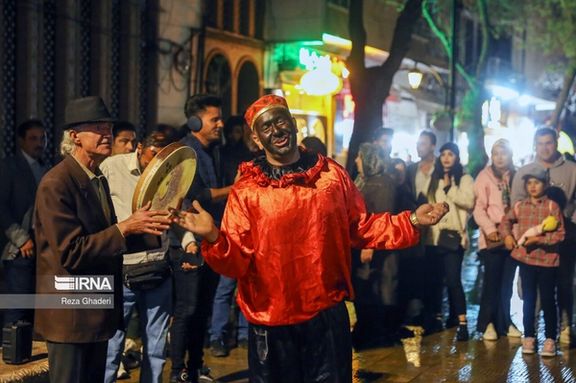
Despite the overlap of Norouz and Ramadan, many Iranians peacefully challenged the clerical regime by engaging in public celebrations, music, and dance, while also refusing to wear the hijab.
The convergence of Norouz holidays with the Islamic fasting month of Ramadan this year has heightened authorities’ frustration with celebrants. They are expected to be fasting and praying instead of participating in what is perceived as 'pagan' festivals involving song and dance.
Celebrants dance around the tomb of Cyrus the Great in Pasargadae.
Celebration of Norouz, and other ancient festivals such as Charshanbeh Souri (bonfire night before the New Year) is not officially banned. However, religious hardliners, who have complete sway over all centers of power now, consider these pre-Islamic festivals pagan and say celebrating them glorifies the pre-Islamic Persian history and paganism at the cost of Islam. For many Iranians, however, there is no contradiction between being Muslim and cherishing the country’s rich history and heritage.
Celebration of Norouz in Kurdish city of Boukan
Authorities typically attempt to prevent gatherings at ancient sites like Persepolis and the tomb of Cyrus the Great in Pasargadae during New Year celebrations and Charshanbeh Souri, often resorting to violence against participants.
This year, despite efforts by authorities, tens of thousands of Iranians headed to Persepolis and Pasargadae to celebrate the turn of the year and the Spring Equinox, which occurred at 6:36:25 local time on March 20. Officials confirmed that around ten thousand people managed to gather there, while reports on social media suggest that many others were halted on the road to Pasargadae.
This year too, tens of thousands of Iranians flocked to Persepolis and nearby Pasargadae, where the tomb of Cyrus the Great is located, to celebrate the turn of the year, the exact moment of the Spring Equinox, which fell at 6:36:25 local time on March 20 this year. Around ten thousand, according to officials, managed to gather there in time but many others were stopped on the road to Pasargadae as social media reports indicate.
Spontaneous dancing in Parsiyan
Elsewhere in Iran – including southern cities of Bushehr and Parsiyan, Shiraz and Isfahan, locals and holiday tourists staged spontaneous dances wherever possible, including at town markets and beaches.
In many other places, particularly in Kurdish towns and villages, such as Ney, a village of around 2,500 near the Kurdish city of Marivan, huge crowds of people have been celebrating Norouz outdoors, with song and dance and bonfires in the past few days.
Participants in Norouz celebrations in Ney village chant Woman, Life, Freedom
According to Hengaw Human Rights Organization, a Kurdish rights group, in Kermanshah, capital of a western province of the same name with a very large Kurdish population, security forces shot and wounded two young Kurdish men, Arman Basiri and Mohammad Ahmadian, on March 21 for merry making at a park.
Hengaw has reported that the victims who sustained serious injuries in the legs have been hospitalized and are under security guard.
Security forces attacking celebrants in Bolbolanabad village
In Bolbolanabad, a village of around 3,600 in Kermanshah Province, security forces also attacked the crowd which included hundreds of children. In a video posted on social media gunfire is also heard.
Stressing that eating and drinking in public is prohibited during Ramadan, Governor of Kermanshah Mohammad-Tayeb Sahraei on Monday said people have a right to display happiness, “but our Islamic beliefs and guarding the modesty and chastity of Kurdish women is a red-line for us,” he added, referring to women’s participation in dances.
Young people dancing on the street in Shiraz
An official of the governor’s office in the same province on Sunday claimed that “anti-Iranian and western media” and “separatists” had used the opportunity to flout “separatist flags and symbols” at Norouz celebrations, giving them “political and security” color and “seeking to cause a political deviation”.
The office of the governor issued a statement on Monday and declared that a permit is required for any large Norouz celebration as celebrations this year seem not to have remained limited to the day of Norouz and are ongoing.
Norouz celebration at village of Karzan, Ilam Province, March 28
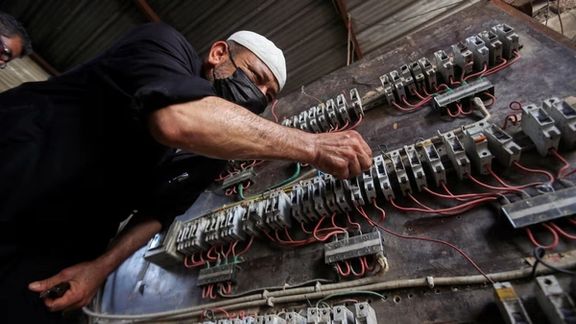
Iran and Iraq have signed a five-year deal that will see Iran pump up to 50 million cubic meters of natural gas per day according to the needs of Iraqi power stations in exchange for oil and gasoline.
Iraq's Ministry of Electricity Ziad Ali Fadhel and the CEO of the National Iranian Gas Company, Majid Chegeni, finalized the contract to extend Iran’s gas exports to Iraq in Baghdad on Wednesday.
After decades of electricity shortages because of war, corruption and mismanagement, oil-rich Iraq is heavily reliant on imported Iranian gas to meet its electricity needs. Iran has been supplying energy to Iraq for the past 10 years under an agreement signed in July 2013.
With an aging electricity grid unable to match the growing demand, Iraq suffers frequent power outages. However, Iran itself is in dire need of natural gas for its domestic electricity production as well as keeping its steel, petrochemical and other heavy industries afloat.
Iran’s insists on gas exports despite the huge deficit in production and growing domestic demand that has severely damaged the country’s industrial sector. Tehran might have various motivations driving this policy, including keeping Iraq dependent.
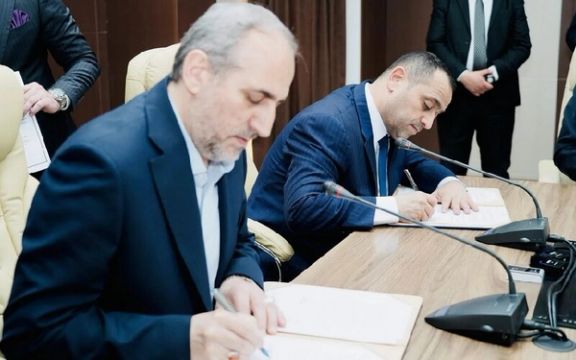
Last year, Iraq imported about nine billion cubic meters of natural gas from Iran, meaning that Tehran supplied about 25 million cubic meters per day. The new deal has envisioned twice that amount but only for periods when Iraq needs it. Iraq’s Ministry of Electricity said the deal would "ensure the sustainability of the work of power plants and keep pace with the peak loads and the increasing demand for electric energy."
Iran’s Oil Ministry’s press service, Shana, claims that Iran’s gas exports has increased to nearly 50 million cubic meters (mcm) per day in recent months after Iraq settled part of the debts it owed to the NIGC.
Over the past five years, there has been a notable disparity between electricity generation and the domestic demand in Iraq. Electricity consumption has increased by nearly 30%, outpacing the government's efforts to meet the surging demand. Imports from Iran are especially vital during the sweltering summer months when Iraqis are forced to pay for private diesel generators or suffer through temperatures that often top 50 degrees Celsius (122 degrees Fahrenheit). The crisis usually comes back amid severe cold weather in winter.
The new agreement with Iran is viewed as a stopgap solution to help Iraq fulfill its electricity requirements while it works on developing its own gas fields. Baghdad is under increasing pressure from the US to wean itself off electricity and gas imports from Iran, under US sanctions since 2018.
In addition to gas supplies, Iraq also relies on Iran for nearly a third of its electricity. However, cash-strapped Iran switches off its electricity and gas exports to put pressure on Baghdad to urge Washington for waivers. Iran only prioritizes its local consumers when Iraq seems unable to transfer the funds.
The US has issued Iraq a series of sanctions waivers to continue importing Iranian energy but has warned the waivers could end if Baghdad does not make serious progress toward finding other fuel and power sources. Although Baghdad has sought to diversify its electricity supply through overtures to countries such as Saudi Arabia, Turkey, Jordan, and Kuwait, no significant progress has been made on these fronts.
The waivers issued by the US every 120 days are reportedly limited to non-sanctioned goods, stressing Tehran could only use the funds for humanitarian trade and seeking to blunt criticism of giving Iran the money that can be used to fund terrorism. However, since July 2023, the US has started allowing Iraq not only to make payments into restricted Iranian accounts in Iraq but also for the funds to be sent to similarly restricted accounts in third countries.
In July, Tehran and Baghdad also agreed to barter oil and gas after Iran cut its gas supply by over 50% due to Iraq’s unpaid debts which worsened the electricity crisis in the country.
In late 2022, the United States tightened measures on Iraq's access to its foreign reserves held in the Federal Reserve due to suspicions of money being transferred to Iran, Syria, and other sanctioned entities.